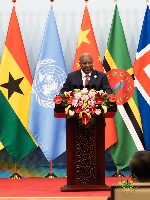CPS commends gov't’s 24-hour economy programme
 Dr. Adu Owusu Sarkodie
Dr. Adu Owusu Sarkodie
The Centre for Policy Scrutiny (CPS) has commended the government’s 24-hour economy, describing it as a bold and comprehensive blueprint for Ghana’s economic transformation.
In a 60-page report titled “The 24-Hour Economy and Accelerated Export Development Programme: A Critical Review”, CPS said the 24-hour initiative represents a strategic and multidimensional effort to reset Ghana’s economy from its overreliance on raw material exports to a value-added, export-driven model.
“The 24-hour initiative marks one of the most comprehensive development strategies in recent years, linking agriculture, manufacturing, logistics, tourism, and finance into a single transformation agenda,” the report said.
“If effectively implemented, it could reposition Ghana as a competitive, job-rich and export-oriented economy.”
The report was prepared by a team led by economist Dr. Adu Owusu Sarkodie and researcher Stephanie Anokyewa Tawia, and released on October 21, 2025.
The 24-hour policy championed by President John Dramani Mahama as an economic reset programme that seeks to transform Ghana’s production base through continuous, multi-shift operations and integrated value chains.
It comprises eight sub-programmes, each targeting a critical sector from agriculture to creative arts.
The programme projects the creation of five million jobs by 2034 and a sustained GDP growth rate of 6 percent.
Among its flagship initiatives are plans to establish agro-industrial parks, industrial corridors along the Volta Basin, inland ports, and up to 40,000 housing units for low- and middle-income earners by 2028.
This, CPS lauded the initiative’s focus on agro-industrialisation, calling it a pragmatic anchor for long-term structural change. The report notes that Ghana’s agricultural potential remains underutilised, and that linking it to value-addition through processing industries could unlock new employment and export opportunities.
“The decision to make the Volta Basin the pivot of the programme is visionary,” the CPS report stated.
“Transforming that corridor into an agro-industrial and logistics hub could rebalance regional development and promote inclusive growth.”
While acknowledging the programme’s vision, CPS review raised concerns about implementation feasibility and fiscal sustainability.
The report noted that the initiative is not yet formally integrated into the National Development Planning Commission (NDPC) framework, creating the risk of duplication with existing programmes such as the Feed Ghana Initiative and the Agriculture for Economic Transformation Agenda.
“Development programmes developed outside the NDPC’s medium-term framework often face weak fiscal alignment and implementation difficulties.
To succeed, the 24-hour must be embedded within the national planning and budgeting cycle,” the report maintained.
CPS also questioned the programme’s estimated cost of US $4 billion, warning that the figure likely underestimates the true fiscal burden.
The think tank pointed to uncosted elements such as tax incentives, infrastructure subsidies, and revenue losses that could significantly inflate the overall bill.
“Given Ghana’s shrinking public investment—averaging just 2.8 percent of GDP over the past decade—the scale of infrastructure proposed under the 24-hour is ambitious,” the report noted.
“Without credible private-sector mobilisation and phased fiscal planning, the programme’s transformative potential may remain unrealised.”
The CPS team urged the government to review proposed tax incentives tied to shift operations, arguing that productivity, employment creation, and export performance should be the guiding metrics for any fiscal concessions.
They also called for robust ex-ante appraisals of major projects to prevent waste and enhance investor confidence, adding that Ghana’s previous experience with poorly prepared capital projects should serve as a cautionary tale.
The report emphasised the importance of institutional learning, citing good economic policies by the previous administration with good intentions but mixed results.
It said the 24-hour economic policy offers a new opportunity to consolidate those lessons, avoid duplication, and strengthen delivery capacity.
In conclusion, CPS expressed optimism that, if properly executed, the policy could be a game-changer for Ghana’s long-term development.
“The programme’s ambition is not in question. What will determine its success is disciplined implementation, transparent costing, and alignment with Ghana’s fiscal and institutional realities.”
This Dr. Sarkodie who is also the Executive Director of the think tank, added that the Centre for Policy Scrutiny stands ready to collaborate with government and development partners in tracking progress and providing independent evaluation of outcomes.
Source: Classfmonline.com/Cecil Mensah
Trending Business

MoFA distributes 25,000 bags of fertiliser to boost minor season crop production
14:31
GCAA grants Air Tanzania air operator certificate
12:03
GA/R: Land dispute triggers 21-day eviction notice for Bohye Market Traders
13:56
Goldbod does not purchase gold from illegal miners — Beatrice Annan clarifies
14:12
Cabinet approves creation of first Marine Protected Area at Greater Cape Three Points
17:52
Ghana Post charts new path for growth and digital transformation at staff durbar
14:59
Razak Kojo Opoku calls for greater indigenous control of Ghana’s economy as Ibrahim Mahama fully acquires Azumah Resources
13:44
President Mahama woos Chinese investors
14:45
Offinso North ‘Pragya’ riders urged to comply with road regulations ahead of legalisation in 2026
12:45
Gov't to waive taxes on agro-processing machinery to boost agribusiness growth
12:19




